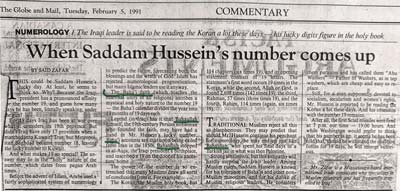
|
|
Abstract: Brief article on the history and symbolism of the number 19, with mention of the Bahá'ís and Saddam Hussein's tolerance of religious minorities. |
___________________________________________________________________________________________
The Globe and Mail, Tuesday, February 5, 1991 COMMENTARY p. A15
=========================================================================================================================
NUMEROLOGY / The Iraqi leader is said to be reading the Koran a lot these days - his lucky digits figure in the holy book
____________________________________________________________________________________________
When Saddam Hussein's number comes up
BY SAID ZAFAR
 click for larger image |
For 19 days Iraq has been at war over what it considers its 19th province. But didn't Iraq have only 17 provinces when it marched into Kuwait? True, but Metropolitan Baghdad became number 18, leaving the lucky number to Kuwait.
And what makes 19 so special? The answer may lie in the "holy" nature of the number, which dates from pagan Arab times.
Before the advent of Islam, Arabs used a fairly sophisticated system of numerology to predict the future, forecasting both the blessings and the wrath of God. Islam has rejected numerological prognostication, but many Islamic leaders use it anyway.
The Bahá'í faith (which teaches the essential unit of all religions) ascribes a mystical and holy nature to the number 19 - the Bahá'í calendar divides the year into 19 months of 19 days each.
Legend (in Iraq) has it that Bahaullah himself, the 19th-century Persian nobleman who founded the faith, may have had a hand in Mr. Hussein's lucky number. Bahá'í accounts say that upon being exiled from Iran in the 1850s, Bahaullah stopped in al-Auja, the Iraqi president's birthplace, and inscribed a 19 on the door of his ancestors' home.
The power of the number is so entrenched that many Muslims draw all sorts of conclusions from it. For example:
The Koran, the Muslim holy book, has 114 chapters (six times 19), and its opening statement consists of 19 letters. The statement's first word occurs 19 times in the Koran, while the second, Allah or God, is found 2,698 times (142 times 19): the third, Rahman, 57 times (3 times 19), and the fourth, Rahim, 114 times (again, six times 19).
Traditional Muslims reject all this as blasphemous. They may predict that should Mr. Hussein continue his penchant for numerology, he may end up just like Bahaullah, who spent his final days in a Turkish jail in what was then Palestine.
Strong sentiments, but this antipathy will hardly surprise the Iraqi leader. Among Muslim rulers, Saddam Hussein is know for his tolerance of Bahá'ís and other non-Muslim minorities, and for his dislike of Muslim religious leaders. He considers them parasites and has called them "Abu Washers" - Father of Washers, as in tap washers, which are cheap and easy to replace.
Still, for a man supposedly devoted to socialism, secularism and women's rights, Mr. Hussein is reported to be reading the Koran a lot these days. And his obsession with the number 19 remains.
After all, the first Scud missiles were fired at 7 p.m. our time - 19:00 hours. And while Washington would prefer to think that his number is up, it seems he has been told that, should he withstand the coalition forces for 19 days, he will emerge victorious.
-
Mr. Zafar is a Mississauga-based international trade consultant who specializes in Muslim countries and has frequently travelled to Iraq
|
|